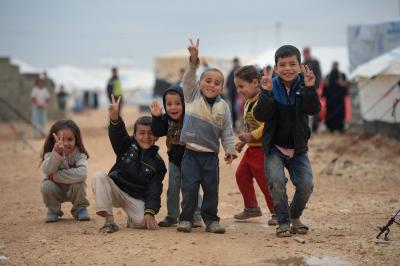Italian government support Syrian child refugees Jordan

ROME- Robert Jenkins, UNICEF representative in Jordan, talked Wednesday about the treatment of child refugees in the Kingdom and strategies that the organisation has put into place to ensure that the situation does not lead to a “lost generation”. The support the Italian government gives to UNICEF was also highlighted.
Jordan, a middle-income country with no natural resources of its own, is in fact home to the largest refugee population in the world. 660,000 Syrian people are currently registered there with refugee status although there are estimated to be about 1.3 million in total. In fact, only 20 percent of these refugees live in camps, the other 80 percent are integrated within villages and cities.
Zaatari refugee camp, the biggest worldwide, is home to 80 thousand refugees and gradually seems to be becoming a more permanent settlement due to the protracted nature of the crisis. Indeed, over seven years after the conflict in Syria began, these citizens are still living in very unstable and vulnerable conditions.
In these types of situations, children often tend to bear the brunt of the problem with a rise in child labour and underage marriage becoming commonplace. In Jordan, 35 percent of marriages involving at least one Syrian, are to girls under the age of 18. This is compared to 18 percent two years ago and 10 percent before the war began.
UNICEF have been working with the government of Jordan and, with support of countries such as Italy, has created a programme in response to the crisis. This has gradually evolved over time, but began with an immediate humanitarian response, providing medical assistance, water and food to those in need. At the start of the war there were 3000 to 4000 Syrians entering the country as refugees each day.
As the crisis has continued a program to provide education to Syrian citizens living in Jordan has been created by the government but also with help from UNICEF. There are currently 235,000 Syrian children of school age registered as living in Jordan, 80,000 of whom do not attend school. The government of Jordan has stated that all children living on Jordanian soil, regardless of nationality, have the right to an education in schools there. UNICEF has also, as of Sept. 6, been promoting a “back-to-school” campaign, with door-to-door visits encouraging families to educate their children. This is a particular area which has received much support from the Italian government, helping prevent this generation of school children from losing out on an education. Psychosocial and learning support are often also required for these children, born in refugee camps, and 220 centres have now been created in Jordan to offer these services.
Other problems, which the organisation and government face, are the lack of water in the Kingdom, which is the second most water-deprived country worldwide and mostly made up of desert. This has been especially difficult with the sudden increase in population, but UNICEF have been working with the ministry of water in the country to encourage better treatment of water in rural areas and ensure conservative use of resources within the refugee camps.
It was made clear in the discussion that appropriate steps are being taken and that the problem is being dealt with well, however, the length of the crisis is certainly a cause for concern. Indeed, as Mr Jenkins himself highlighted, one of the greatest fears of the government of Jordan and of UNICEF, is that, due to the protracted nature of the crisis, global interest will eventually turn elsewhere. International support is very much still needed in Jordan and can be seen as invaluable, particularly for these children growing up without a permanent home.
ES


